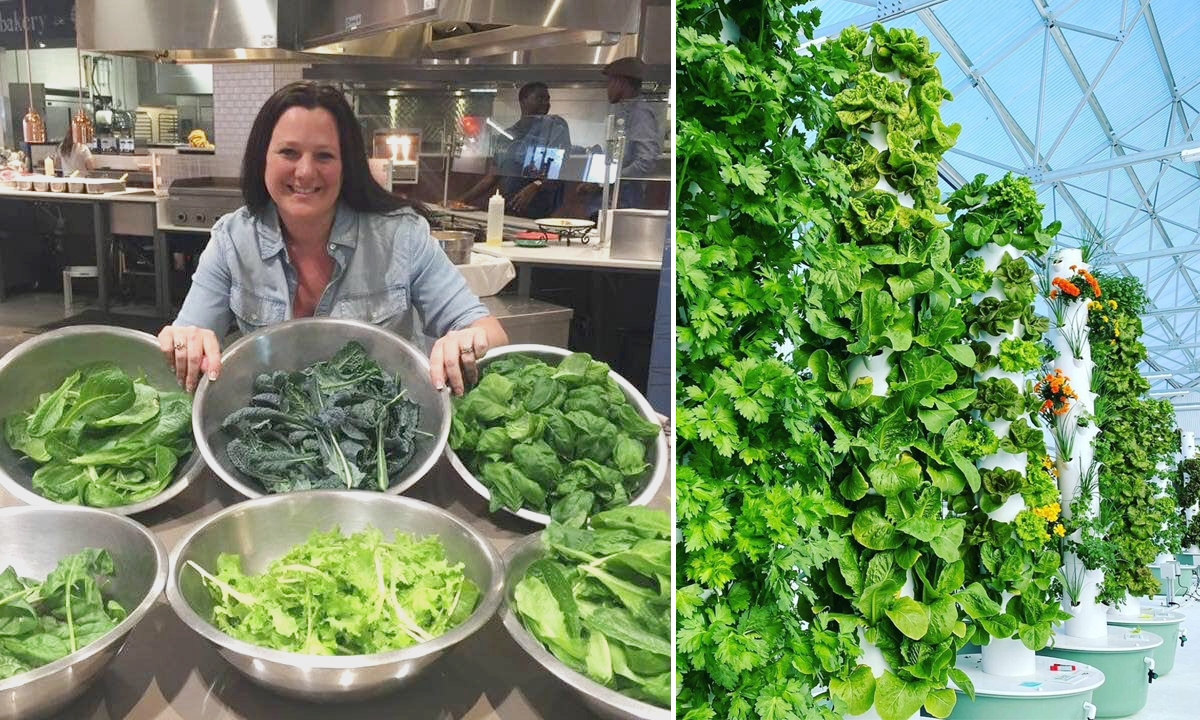
Tower Gardens — an interview with urban farmer Becky Black
As Canadians have kept to themselves this spring, and have thought more about their groceries and eating habits, some have been buying Tower Gardens to grow herbs, vegetables and more at home. Local representatives, Becky Black, grew up on a Southern Ontario dairy farm; she says she’s glad to know where her food comes from again, and is glad to share that experience with others. She spoke to us about this unusual season, and what urban farming can offer.
OL: In your blog post, you said you’ve seen an increase in sales during the pandemic.
Becky Black: Sales have definitely increased—people are finally waking up and recognizing “You know what? We wanna start growing our own food.” They know food prices will definitely increase. Our soils are depleting as a matter of fact and our Tower Gardens have actually sold out twice. That’s never happened in eight years, so we’ve had to get new shipments in.
OL: Do you think the pandemic has shown the importance of growing your own food, or is it more of a hobby, like baking bread?
BB: Yes, I really do think the pandemic put some fear in people, they wanted to reduce their trips to the grocery store. I remember I had high anxiety about going to the grocery store when it all first started. It was crazy to see the interest that just peaked. We do a ton of online events, and people were available for the presentations, because they’re all at home.
Since I’ve started selling Tower Gardens, I’ve been able to get them into over 80 schools throughout the city of Ottawa. I really do believe we need to start teaching kids where food comes from, because most think a potato comes from McDonald’s, and the rest comes from mom and dad and the grocery store. That’s a lot of city kids, but they just don’t know, and I think it’s so important.
And the Tower Garden comes with a full school curriculum, from J.K. all the way up to high school for the teachers to utilize in the classroom.
OL: What’s selling these Tower Gardens to schools like?
BB: That was my ultimate goal when I first saw them, I thought “oh my god, I have to get these into classrooms.”
When children plant their own food it encourages healthier eating habits—they actually want to eat it. So now we’re able to circulate it into the classroom (“let’s have a salad party!”), which encourages healthier diets. There’s science behind it, there’s math behind it, it’s so much more than a garden.
And the best part is that most school gardens grow in soil outside. Well by the time they’re ready to be harvested, school is out! With our Tower Gardens, you can add grow lights and you can have them in the classroom starting in September and grow all school season.
OL: To get into the science for a second, how can you grow food without soil? How does this work?
BB: We use a growing medium called rock wool. It’s like a sponge, and you soak the rock wool, you add your seeds into it, and once your seeds are germinated and have a strong root system, you pluck off the cube and you pluck it into the pocket of the tower garden. And I’m telling you, weekly maintenance on a Tower Garden is, tops, is 30 minutes. Imagine a soil garden: you’re weeding, you’re bending, your digging. If there’s a drought, you’re constantly watering, where the Tower Garden just waters itself.
OL: Tower Gardens, like other aeroponic gardens, rely on a system to function. How do people manage when there’s an issue with their garden?
BB: Life happens, right? A power outage would be the worst thing that could happen, but I’ve had power outages for 12 hours and all I tell them is that the water’s on a timer—when it’s inside it’s 15 minutes on, 45 minutes off. So when somebody has a power outage I tell them “okay, go turn your pump on continuously for 12 hours”, and usually the plants will come back to life.
So that’s a downfall, because it’s powered. But I have never seen my hydro bill increase with it. Our grow lights are LED bulbs which have a lifespan of 200,000 hours, like a night light. When growing outdoors with these units, you can grow watermelons, cucumbers, zucchinis.
My dream would be to see this on every rooftop where it’s possible to grow food. Because I don’t think we do enough, especially in places of learning, education, hospitals—why aren’t there gardens in hospitals? Why aren’t we providing more real food in places of healing?
OL: Are Tower Gardens useful for people with space in their backyards to grow their own crops, or is it more for people who don’t have a lot of land to grow on?
BB: It’s for anybody. It’s really amazing for people with small spaces—it’s great for condos, for apartments. But even if they have access to soil, I would say “you know what? Plant your potatoes and your beets and your carrots in your soil, save your Tower Garden maybe for your leafy greens and herbs.” Anybody can benefit from a Tower Garden ultimately because you can grow in the winter.
OL: You say that over time a Tower Garden will save people money on groceries. Can you give me some sense of how this works out, how can you save money even within the one-year purchase agreement?
BB: Let’s say I have a tower with 28 pockets, and each growing pocket is worth 5 bucks. I’m basing this on leafy greens and herbs. 28 times 5 times 3, because you’re gonna get three harvests—that’s the simplest way I can come up with [for thinking about this]. And you’re not wasting food.
OL: So you don’t waste food because it’s not going to go bad in your fridge while it’s still growing, is that right?
BB: Yes, it’s live! But as soon as the plant is removed from its vine, it starts a process called oxidization and it just starts losing all of its nutrients. Think about all of those plants we buy on the truck—you know how it all works, and then it gets to the grocery store. It’s really great nutrition.
We have a bundle pack of three Tower Gardens, and when people buy those, that’s when I would have a chat with them and go “look, what’s really important?” because obviously your vining plants and your cucumbers and your peppers, they take a while. So you’ve really got to take a look at the yield it’s going to provide you. But leafy greens and herbs are so abundant that I have clients that are like “oh my goodness, I have to start sharing this with my neighbours because it produces so much.”








